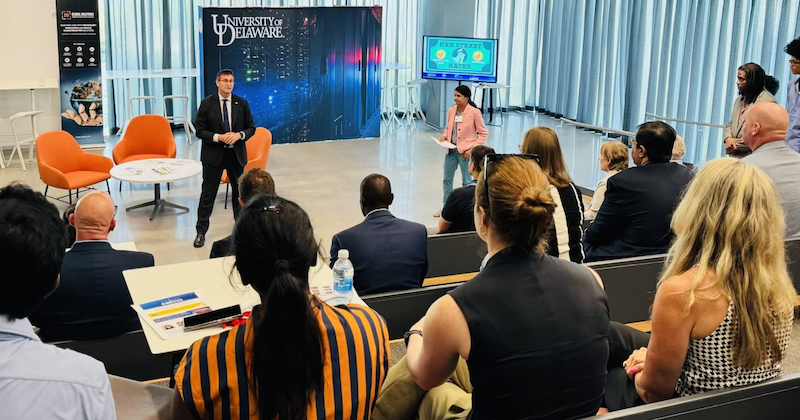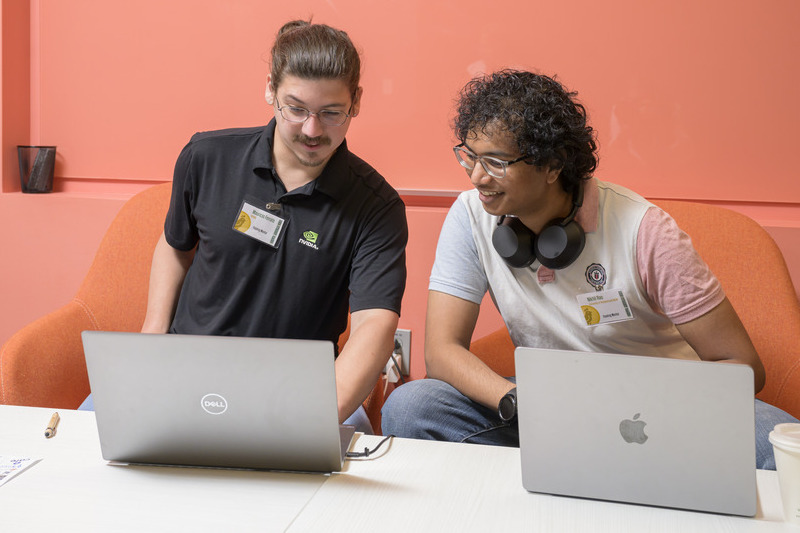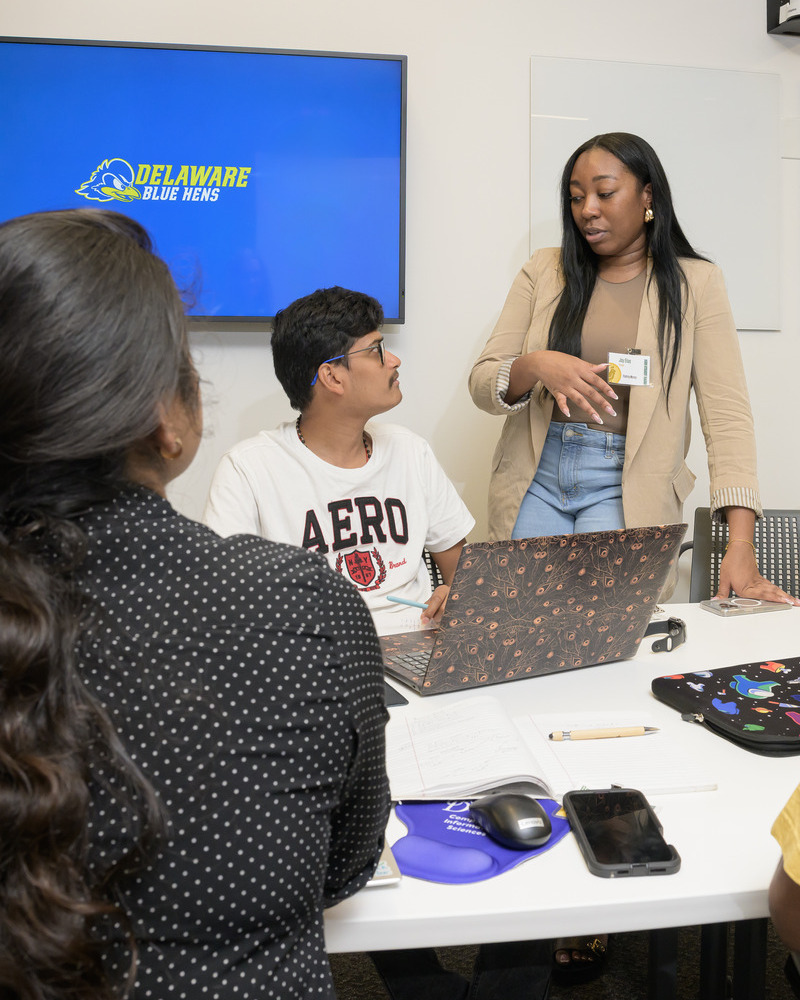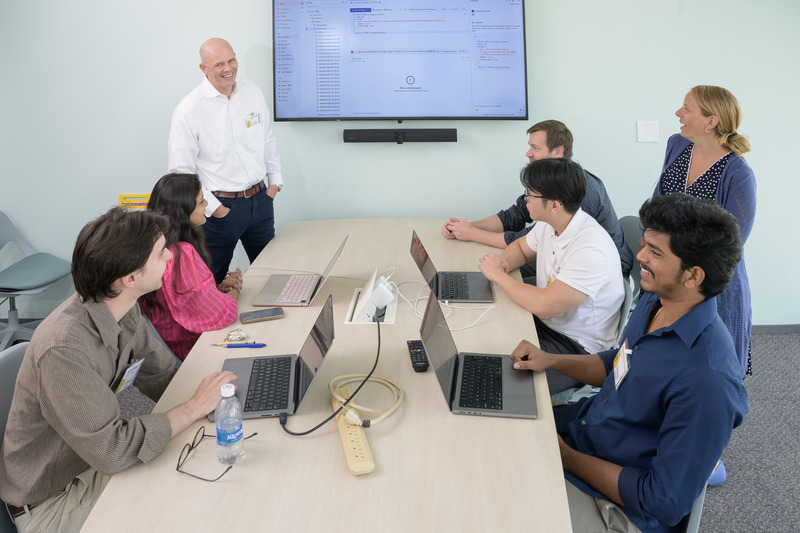


AI meets real intelligence at UD hackathon
Photos by Kathy F. Atkinson and Abhin Suresh November 13, 2025
UD students and industry leaders team up to solve fintech challenges
The University of Delaware is helping students gain a critical edge in the rapidly evolving world of artificial intelligence. At a recent hackathon on UD’s Science, Technology and Advanced Research (STAR) Campus, students teamed up to tackle real-world problems brought by some of the biggest companies in finance and technology.
As the only current U.S. governor with a double major in computer science and political science, Delaware Gov. Matt Meyer was an enthusiastic supporter.
“Our economy is changing pretty dramatically,” Meyer said to an audience of about 80 master’s and Ph.D. students, faculty and business leaders gathered at UD’s new First State AI Institute in the FinTech Innovation Hub. “The reality is, as the economy evolves, we face a choice: to win that future or not win that future.”
While many Americans are uneasy about AI’s impact on jobs, privacy and ethics, Meyer struck an optimistic note.
“Our success comes down not to artificial intelligence, but to real intelligence — people willing to do that hard work. So, what you’re doing is vitally important to our future.”
Putting AI to the test
Hackathons — short for “hacking marathons” — are designed to spark creativity, collaboration and problem-solving. During “Hen Street Hacks” at UD, students worked in teams to address 11 case studies focused on financial services technology, or fintech. Topics ranged from detecting irregularities in spending data (JPMorgan Chase) to integrating a chatbot into a service management system (Best Egg) to predicting monthly U.S. retail sales using bank data (Bank of America).

Students used software applications and other computing resources from Google, NVIDIA and Databricks as they worked on problems, while mentors from those firms — as well as from Infinitive, Bank of America, Best Egg, JPMorgan Chase, PerPay, Adaptive Connections, Sallie Mae, SID Global Solutions, Mooves, Saimeera Cloud and Venderly — provided guidance.
“The emphasis really is on the journey — how you use your creativity and collaborate,” Prof. Sunita Chandrasekaran, director of the First State AI Institute, told the students. “You’ll be overwhelmed. If you’re not, we have a problem. We want you to take away technical skills and soft skills, make new friends and build connections.”
In video remarks, U.S. Senator Chris Coons told students they have a key role in shaping AI, balancing innovation and progress with safety.
“Now, more than ever, we have to keep investing in the responsible use of technology and make sure our next generation of technology leaders are well trained,” Coons said. “AI will define the rest of this century, for both good and ill. We need growth; we also need guardrails.”

For Joy Elias, customer engineer for Google, the event was a chance to help mentor students and minimize some of the hype around AI.
“AI can’t replace what humans bring to the table,” she said. “You need humans in the room. We don’t use AI to take away from human capabilities.”
Industry eyes on innovation
For companies, hackathons are more than outreach — they’re also scouting opportunities.
“Honestly, I’m looking for fresh, innovative ideas,” said Ajay Yeluri, chief technology officer at SID Global Solutions. “We’re always looking for bright researchers and talent.”
Adrian Hsieh, principal at Adaptive Connections, joined the event through the nonprofit Center for Accelerating Financial Equity (CAFÉ), which promotes fintech access for underserved communities. His team worked to automate data mapping — a major bottleneck that slows integration between new fintech apps and legacy banking systems.
“Hackathons like this help us find talent and push the technology forward,” Hsieh said.
J.D. Herr, head of data at the Philadelphia startup PerPay, also provided a case study and served as a mentor. He said hackathons keep an important connection open between industry and academia.
“We’re in a race to ensure we’re not being left behind,” said Herr, who has a doctorate in theoretical and computational chemistry. “So, we bring a real understanding of the business world to the academic experience. Events like this also ground how AI can be used. It’s a tool in your toolbox, not just a cheat code.”
The power of soft skills
Technical know-how isn’t the only thing fintech employers are looking for, according to Rob Tattersall, head of learning development and recruiting at Sallie Mae, who led a career session at the event.
“What does it cost us to hire the wrong person? Even at entry level, it’s a lot,” Tattersall said.
When asked what qualities companies value most, the students listed teamwork, confidence, problem-solving, business acumen and adaptability.

“Those are all important,” Tattersall noted, “but one thing you didn’t mention is communication. It’s a huge soft skill — and often what makes the difference.”
Mumtarin Aishee, who recently earned her master’s in business analytics and information management at UD, joined the hackathon to broaden her understanding of how AI is reshaping business and to expand her network.
Her team, named “Storecasters,” took on a case study from Venderly, a business platform for schools with student entrepreneurs, that called for development of a chatbot.
One of Aishee’s teammates was Lois Ogeri Ifeanyichukwu, a recent master’s graduate from Wilmington University, whose background spans finance, IT risk and cybersecurity. Now considering doctoral studies, she hopes to use AI to bridge the gap between accounting and information assurance.
“This is fascinating to me,” Ifeanyichukwu said. “At first, we were scared to participate, but Sunita said, ‘Come down and join us — we’re all trying to figure it out.’”
Two Delaware high school students, Anushree Thirukumaran from Charter School of Wilmington and Aiden Gamble from Brandywine High School, also took part in the hackathon.
Gamble, the youngest member of Delaware’s AI Commission, said he has a passion for artificial intelligence and an awareness of its challenges, including deep fakes and privacy issues. But he’s more curious than fearful about the technology.
“I want to know how to interact with and learn AI,” he said. “I want to be a part of it.”
Contact Us
Have a UDaily story idea?
Contact us at ocm@udel.edu
Members of the press
Contact us at mediarelations@udel.edu or visit the Media Relations website

